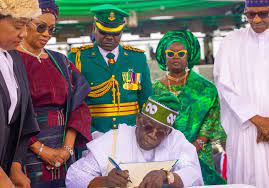By Akintoye Oluyemi Ayorinde
Thank you for reading this post, don't forget to subscribe!Email: highsensenewsblog@gmail.com

President Bola Ahmed Tinubu of Nigeria has been at the center of intense scrutiny and debate regarding his economic policies and plans for the nation. Despite facing criticisms from various quarters, there is a growing belief that President Tinubu possesses the vision and determination needed to enact transformative changes and revitalize Nigeria’s economy. This article delves into the key aspects of President Tinubu’s economic agenda, analyzes the potential impact of his policies, and explores how his strategies may lead to significant improvements in the country’s economic landscape.
Introduction to President Bola Ahmed Tinubu’s Economic Agenda
President Bola Ahmed Tinubu of Nigeria has set forth an ambitious economic agenda aimed at revitalizing the country’s economy and fostering sustainable growth. With a background in finance and a keen understanding of Nigeria’s economic landscape, Tinubu is poised to implement impactful policies to drive progress and prosperity.
Background and Political Context
As a prominent political figure in Nigeria, President Tinubu brings a wealth of experience and expertise to the table. Known for his strategic approach to governance, Tinubu’s economic agenda is closely tied to his vision of a more prosperous and equitable Nigeria. With a reputation for being a shrewd operator, Tinubu’s policies are expected to reflect his pragmatic and results-oriented leadership style.
Criticisms of President Tinubu’s Economic Policies
President Tinubu’s economic policies have not been without criticism, with skeptics raising concerns about the feasibility and efficacy of his proposed reforms. From concerns about the pace of implementation to questions about the prioritization of certain sectors, stakeholders have voiced a range of opinions on Tinubu’s economic agenda.
Evaluating Criticisms from Various Stakeholders
Critics argue that Tinubu’s economic policies lack specificity and fail to address key structural issues facing Nigeria’s economy. Some express doubts about the sustainability of his proposed initiatives and question whether they will truly deliver the intended outcomes. Despite these reservations, supporters of Tinubu remain optimistic about the potential for meaningful change under his leadership.
Challenges and Controversies Surrounding Tinubu’s Economic Plans
Navigating the complex terrain of Nigeria’s economic landscape poses a significant challenge for President Tinubu. From addressing corruption and inefficiency to promoting inclusive growth, Tinubu faces a myriad of obstacles in implementing his economic agenda. Moreover, controversies surrounding certain policy decisions have further fueled skepticism about the feasibility of Tinubu’s plans.
Overview of Tinubu’s Key Economic Programs
President Tinubu’s economic programs encompass a wide range of initiatives aimed at fostering economic growth, creating jobs, and improving the overall well-being of Nigerians. From infrastructure development to industry revitalization, Tinubu’s agenda is multifaceted and comprehensive in its approach to addressing the country’s economic challenges.
Details on Major Initiatives and Reforms
Key components of Tinubu’s economic programs include investments in critical infrastructure projects, reforms to streamline bureaucratic processes, and incentives to attract foreign investment. By prioritizing job creation and economic diversification, Tinubu aims to lay the foundation for sustainable growth and development in Nigeria.
Goals and Objectives of Tinubu’s Economic Agenda
Central to Tinubu’s economic agenda are goals of boosting GDP growth, reducing unemployment, and enhancing the competitiveness of Nigeria’s economy. By focusing on key sectors such as agriculture, manufacturing, and technology, Tinubu seeks to foster innovation and productivity to drive long-term prosperity for the country.
Analysis of the Potential Impact of Tinubu’s Policies
The success of President Tinubu’s economic policies hinges on their ability to stimulate economic activity, create jobs, and improve living standards for Nigerians. By evaluating the potential impact of Tinubu’s initiatives, stakeholders can gain insights into the effectiveness and sustainability of his economic plans.
Projected Effects on GDP Growth and Employment
Projections suggest that Tinubu’s policies have the potential to spur GDP growth and reduce unemployment rates in Nigeria. By promoting investment, enhancing productivity, and fostering innovation, Tinubu’s economic agenda aims to create a conducive environment for sustainable economic expansion and job creation.
Assessing the Long-Term Sustainability of Tinubu’s Economic Plans
Sustainability is a key consideration in evaluating the long-term impact of Tinubu’s economic plans. By addressing systemic challenges and promoting inclusive growth, Tinubu seeks to establish a solid foundation for sustainable development in Nigeria. However, the success of his policies will depend on their ability to withstand external shocks and adapt to evolving economic dynamics.
Tinubu’s Strategies for Economic Growth and Development
President Bola Ahmed Tinubu of Nigeria is rolling up his sleeves to tackle the country’s economic challenges head-on. His focus on investment promotion and infrastructure development is a key part of his strategy. By creating a conducive investment climate and improving infrastructure, Tinubu aims to attract both local and foreign investors, boosting economic growth and creating job opportunities.
Investment Promotion and Infrastructure Development
Tinubu understands that modern infrastructure is the backbone of a thriving economy. By investing in roads, rail networks, power supply, and technology, he is laying the foundation for sustainable economic growth. This approach not only improves the quality of life for Nigerians but also enhances the country’s competitiveness on the global stage.
Social Welfare Programs and Poverty Alleviation
In addition to infrastructure development, Tinubu is committed to implementing social welfare programs to alleviate poverty and empower disadvantaged communities. By providing support for education, healthcare, and micro-enterprises, he aims to create a more inclusive economy where everyone has the opportunity to thrive.
Comparing Tinubu’s Approach with Previous Administrations
When comparing Tinubu’s approach to economic governance with previous administrations, it’s clear that he is charting a new course. By contrast, his economic policies and philosophies prioritize sustainable development, transparency, and accountability.
Contrasting Economic Policies and Philosophies
Unlike some past leaders who focused on short-term gains or relied heavily on oil revenue, Tinubu’s approach is more diversified and forward-thinking. His emphasis on sectors like agriculture, technology, and manufacturing shows a commitment to building a resilient economy that can weather fluctuations in global markets.
Lessons Learned from Past Economic Reforms in Nigeria
Tinubu is not blind to the mistakes of the past. He is keen on learning from previous economic reforms in Nigeria, understanding what worked and what didn’t. By adopting a pragmatic and evidence-based approach, he aims to avoid the pitfalls that derailed previous efforts to transform the economy.
Addressing Challenges and Implementing Reforms
To succeed in turning the economy around, Tinubu must confront the challenges that have long hindered Nigeria’s progress. Tackling corruption, improving governance, and engaging stakeholders are critical steps in implementing meaningful reforms that will benefit all Nigerians.
Tackling Corruption and Improving Governance
Corruption has been a persistent issue in Nigeria, undermining development and eroding public trust. Tinubu understands the importance of rooting out corruption at all levels of government and instituting reforms that promote transparency and accountability. By strengthening governance structures and empowering anti-corruption agencies, he aims to create a more just and equitable society.
Engaging Stakeholders and Building Public Support
Turning the economy around requires the support and participation of all stakeholders, including government officials, business leaders, civil society, and the general public. Tinubu knows that building consensus and fostering collaboration are essential for implementing sustainable reforms. By engaging with diverse groups and listening to their concerns, he can build a broad coalition in support of his economic agenda.
Conclusion: The Path Forward for Nigeria’s Economy under Tinubu
Despite facing criticism and skepticism, President Bola Ahmed Tinubu’s commitment to revitalizing Nigeria’s economy through effective programs is unwavering. With a focus on investment promotion, infrastructure development, social welfare programs, and tackling corruption, Tinubu is laying the groundwork for a more prosperous and equitable future for all Nigerians. By learning from the lessons of the past and engaging stakeholders in the reform process, Tinubu is poised to lead Nigeria towards a brighter economic horizon.In conclusion, President Bola Ahmed Tinubu’s commitment to driving economic growth and development in Nigeria through his comprehensive programs and reforms offers a promising path forward for the nation. While facing challenges and criticisms, Tinubu’s unwavering dedication to implementing effective policies could indeed pave the way for a brighter economic future for Nigeria, benefiting its citizens and positioning the country for sustainable progress in the years to come.

